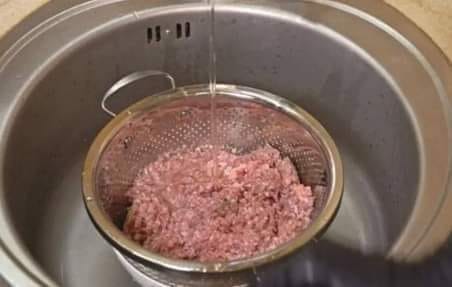Should you wash ground beef before cooking it? It’s a question many home cooks ask, and opinions on the topic vary. While some believe rinsing ground beef helps reduce fat, others argue that it’s unnecessary and may even cause more problems than benefits. Let’s break it down and explore the pros, cons, and best practices for handling ground beef.

The Argument for Washing Ground Beef
Some chefs and health-conscious cooks believe that washing ground beef can help reduce its fat content. The idea is that rinsing the beef with water removes some of the grease, which can be appealing for those trying to reduce calorie intake or avoid overly greasy meals.
For people focused on eating lighter meals, washing ground beef might seem like a practical step to make their dishes healthier.
Why You Should Skip Washing Ground Beef
While the idea of reducing fat may sound good in theory, most experts recommend not rinsing ground beef. Here’s why:
- Loss of Flavor and Moisture
Fat is what gives ground beef its juicy texture and rich flavor. When you rinse it, you’re not just removing grease—you’re also stripping away the fat that makes the meat tender and delicious. As a result, your dish may end up dry, bland, and lacking depth of flavor. - Unnecessary Mess and Cleanup
Washing ground beef can create a huge mess. The water can cause grease to splatter across your sink, countertops, and kitchen, leading to more cleanup. Plus, raw meat juices can contaminate surfaces and increase the risk of spreading bacteria like salmonella or E. coli. - Plumbing Problems
Pouring grease or fat-laden water down the sink is a big no-no. When grease cools, it solidifies in your pipes, leading to clogs and expensive plumbing issues. A better approach is to drain the cooked beef, let the fat harden, and dispose of it in the trash.
The Best Way to Handle Ground Beef
Instead of washing ground beef, here are some simple steps to prepare and cook it safely while maintaining flavor:
- Drain the Fat After Cooking
- Cook the ground beef over medium heat until it’s browned and fully cooked.
- Use a slotted spoon to transfer the beef to a plate lined with paper towels to absorb excess grease.
- If you need to discard the fat, let it cool, harden, and throw it away in the trash. Never pour it down the drain.
- Choose Leaner Ground Beef
- If you’re concerned about fat content, opt for leaner ground beef, such as 90/10 (90% lean, 10% fat) instead of 80/20. This reduces the need for rinsing while still delivering flavor and moisture.
- Cook the Beef Properly
- Use medium heat to cook the beef evenly without drying it out. Overcooking can also make ground beef dry and flavorless, even without washing.
- Flavor with Spices and Herbs
- To enhance the taste of leaner beef, add seasonings like garlic powder, onion, paprika, or fresh herbs. This can help compensate for the lower fat content without sacrificing flavor.
Is Washing Ground Beef Ever Necessary?
For most recipes, washing ground beef is unnecessary and can actually make your dish less enjoyable. However, if you’re specifically looking to reduce fat for dietary reasons, you might consider rinsing it after cooking. Here’s how:
- Place the cooked beef in a colander.
- Rinse it briefly under hot water to wash away excess grease.
- Allow it to drain thoroughly before adding it back to your recipe.
While this method does reduce fat, keep in mind that it will also affect the meat’s flavor and texture.
Final Thoughts
Ultimately, whether or not to wash ground beef comes down to personal preference. While some may see rinsing as a way to reduce fat, it’s generally not necessary and can cause flavor loss, kitchen messes, and plumbing headaches.
If you’re looking for healthier options, choosing leaner beef and properly draining the fat after cooking are far more effective methods. These steps ensure you enjoy flavorful, juicy ground beef without the downsides of washing it.
So, the next time you’re browning ground beef for tacos, burgers, or spaghetti sauce, skip the rinsing step and focus on cooking it the right way. Your taste buds—and your kitchen sink—will thank you!



